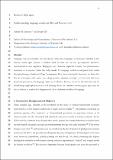Understanding language evolution : beyond Pan-centrism
Abstract
Language does not fossilize but this does not mean that the language's evolutionary timeline is lost forever. Great apes provide a window back in time on our last prelinguistic ancestor's communication and cognition. Phylogeny and cladistics implicitly conjure Pan (chimpanzees, bonobos) as a superior (often the only) model for language evolution compared with earlier diverging lineages, Gorilla and Pongo (orangutans). Here, in reviewing the literature, it is shown that Pan do not surpass other great apes along genetic, cognitive, ecologic, or vocal traits that are putatively paramount for language onset and evolution. Instead, revived herein is the idea that only by abandoning single-species models and learning about the variation among great apes, there might be a chance to retrieve lost fragments of the evolutionary timeline of language.
Citation
Lameira , A R & Call , J 2020 , ' Understanding language evolution : beyond Pan -centrism ' , BioEssays , vol. Early View , 1900102 . https://doi.org/10.1002/bies.201900102
Publication
BioEssays
Status
Peer reviewed
ISSN
0265-9247Type
Journal article
Collections
Items in the St Andrews Research Repository are protected by copyright, with all rights reserved, unless otherwise indicated.

